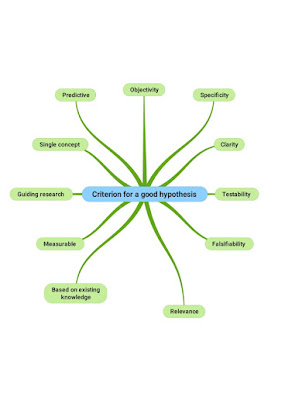Criterion for a Good Hypothesis
A supposition or
proposed explanation made on the basis of limited evidence as a starting point
for further investigation or a proposition made as a basis for reasoning,
without any assumption of its truth.
There are many definitions for hypothesis in research because of its key role in a research. A hypothesis states your predictions about what your research will find. It is a tentative answer to your research question that has not yet been tested. For some research projects, you might have to write several hypotheses that address different aspects of your research question.
A
hypothesis is not just a guess – it should be based on existing theories and
knowledge. It also has to be testable, which means you can support or refute it
through scientific research methods (such as
experiments, observations and statistical analysis of data).A hypothesis
is a clear, specific and testable statement that proposes a relationship
between variables. A hypothesis is a tentative statement about the relationship
between two or more variables. A hypothesis is a specific, testable prediction
about what you expect to happen in your study. The Hypothesis consist of two
words hypo and thesis. Hypo means tentative or subject to
the verification and Thesis means statement about solution of a problem. In
short, the word meaning of the term hypothesis is a tentative statement about
the solution of the problem. George J
Mouly opines Hypothesis as an assumption or proposition whose testability is to
be tested on the basis of the compatibility of its implication with empirical
evidence with /previous knowledge.
Criterion
for a Good Hypothesis
The
hypothesis should be capable of being proven false based on empirical evidence.
It uproots the idea that no theory is completely correct, but if it can be
shown both to be falsifiable and supported with evidence that shows it’s true,
it can be accepted as truth.
There
are many key criteria to be followed while formulating a hypothesis than the
two basic
criteria that it should deal with a statement about the relations between
variables and its carrying ability of clear implications for testing the stated
relations (Thus, these couple of criteria imply that hypotheses comprise two or
more variables which are measurable and that they specify the way in which they
are related. A statement which fails to meet these criteria is no scientific
hypothesis in the true sense of the term.) And they are:
Clarity
Clearly
states the relationship or prediction being tested. A
hypothesis is a clear, specific, and testable statement that proposes a
relationship between variables.
Specificity
As
the word meaning suggests it should possess the capacity to clearly define the
variables involved and the expected outcomes because having a concise
hypothesis makes it obvious to the reader when your transition from background
information to a research question without having to state.
Testability
It should be possible to test the hypothesis through experimentation or
observation.
Relevance
The
hypothesis should be relevant to the research question or problem being
addressed. Relevance can be taken as a measure to determine the value of
hypothesis.
Based on existing knowledge
It
should be grounded in existing theories or observations also should be grounded
in past knowledge gained from the literature review or from theory.
Measurable
Variables
should be quantifiable, allowing for the collection of data. Variables should
be measurable so that its characteristics or properties of people or things can
take up different values. To get the acknowledgement it is very important to
possess the measuring capacity.
Guiding research
Provides direction for the research and
suggests an experiment or study design or a hypothesis should contain a pathway
to travel through the research.
Single concept
A
hypothesis is supposed to be succinct prediction of an effect in response to a
cause. If X occurs, then Y will happen.
Predictive
A
hypothesis needs to be a statement of what will happen, given a stimuli: that
is a statement of effect, given a cause. A hypothesis helps define an
experiment to test an idea and answer a research question.
Than the above quoted key criteria
there are certain general principles to be followed while preparing hypothesis,
among which identifying the independent variables to be studied. Specifying the
nature of relationship that exists between these variables is the other
mandatory step to be taken. It is better to be concise than to be long-winded.
It is also better to have several simple hypotheses than one complicated hypothesis. It does not refer to
specific statistical procedures that will be used in analysis. To imply the
population that you are going to study is also necessary along with ensuring
its falsifiable capacity and testability.
So,
formulation of hypothesis is not a mere task instead it is a time taking and
structured process through which the researcher has to carefully travel.
|
Questions |
Why |
|
Is
the language clear and focused? |
To
ensure understanding |
|
What
is the relationship between your hypothesis and your research topic? |
To
provide clear idea |
|
Is
your hypothesis testable? |
To
prove accuracy |
|
What
are the possible explanations that you might want to explore |
To
explain its scope |
|
Does
your hypothesis include both an independent and dependent variable? |
To
create an acquaintance |
|
Can
you manipulate your variables without hampering the ethical standards? |
To
showcase the ethical standards |
|
Is
it relevant and specific to the research question or problem? |
To
acknowledge its contemporary relevance |
Functions of Hypothesis
Image no 1 shows the
functions of hypothesis.
Explanation video of the topic





No comments:
Post a Comment